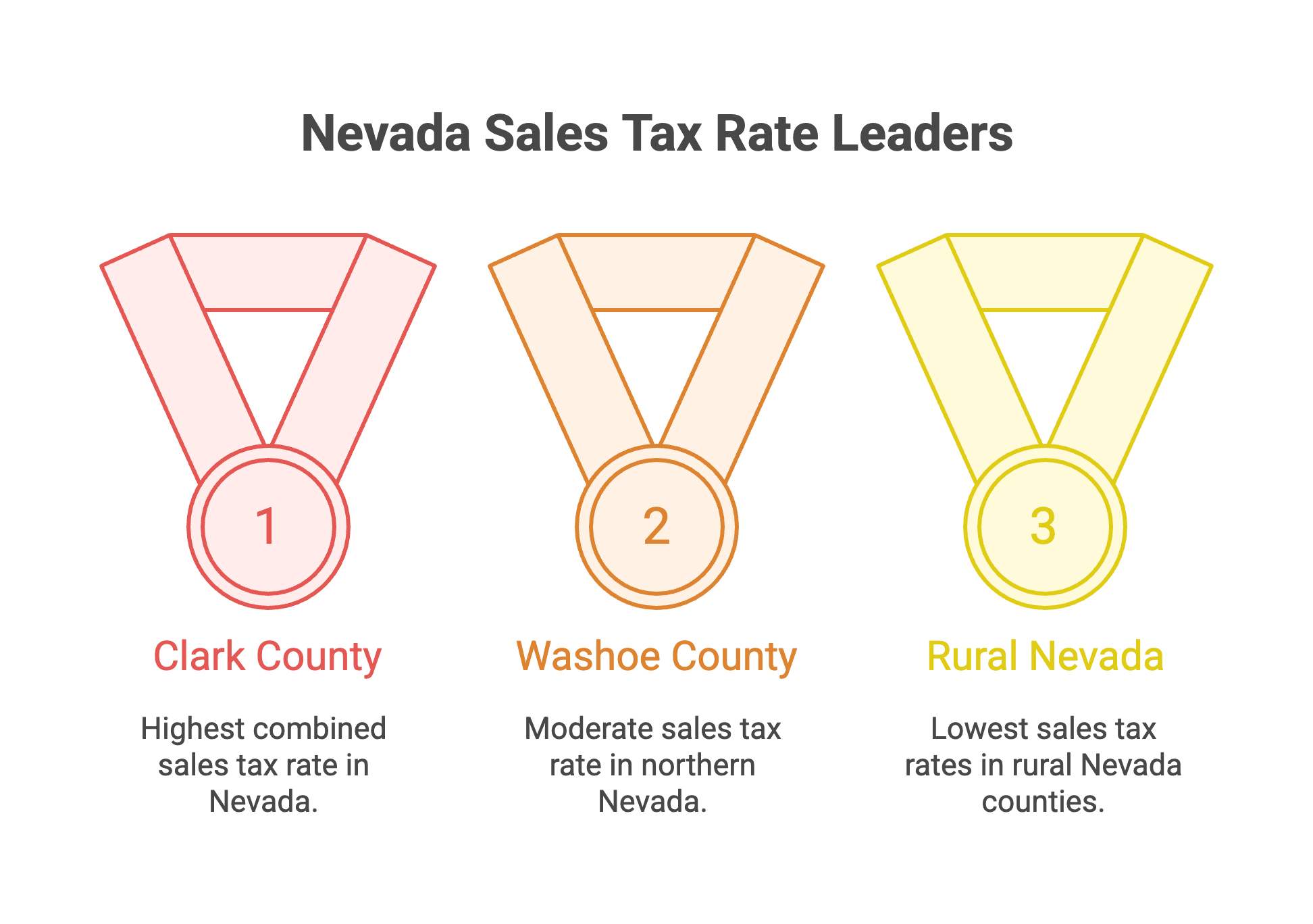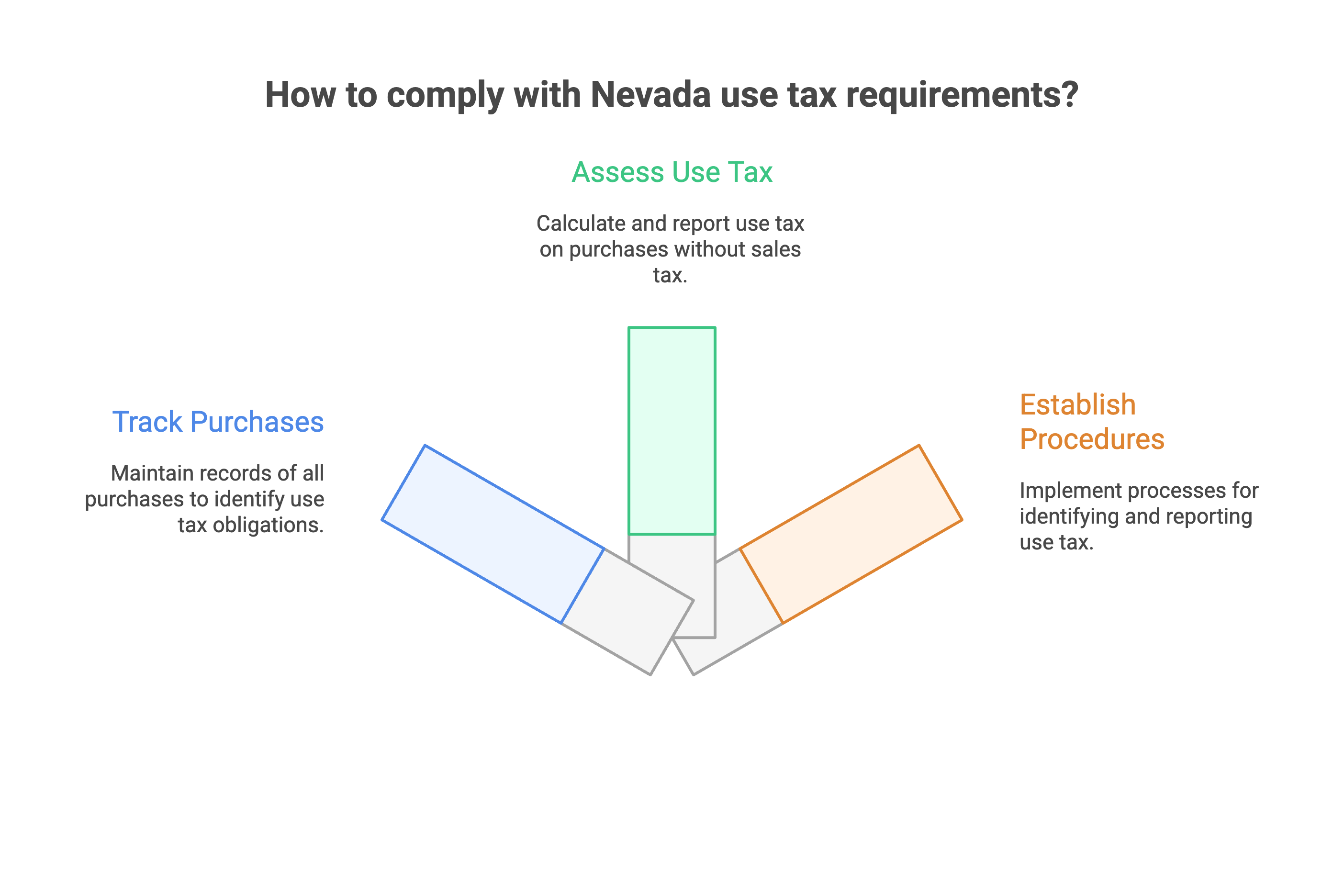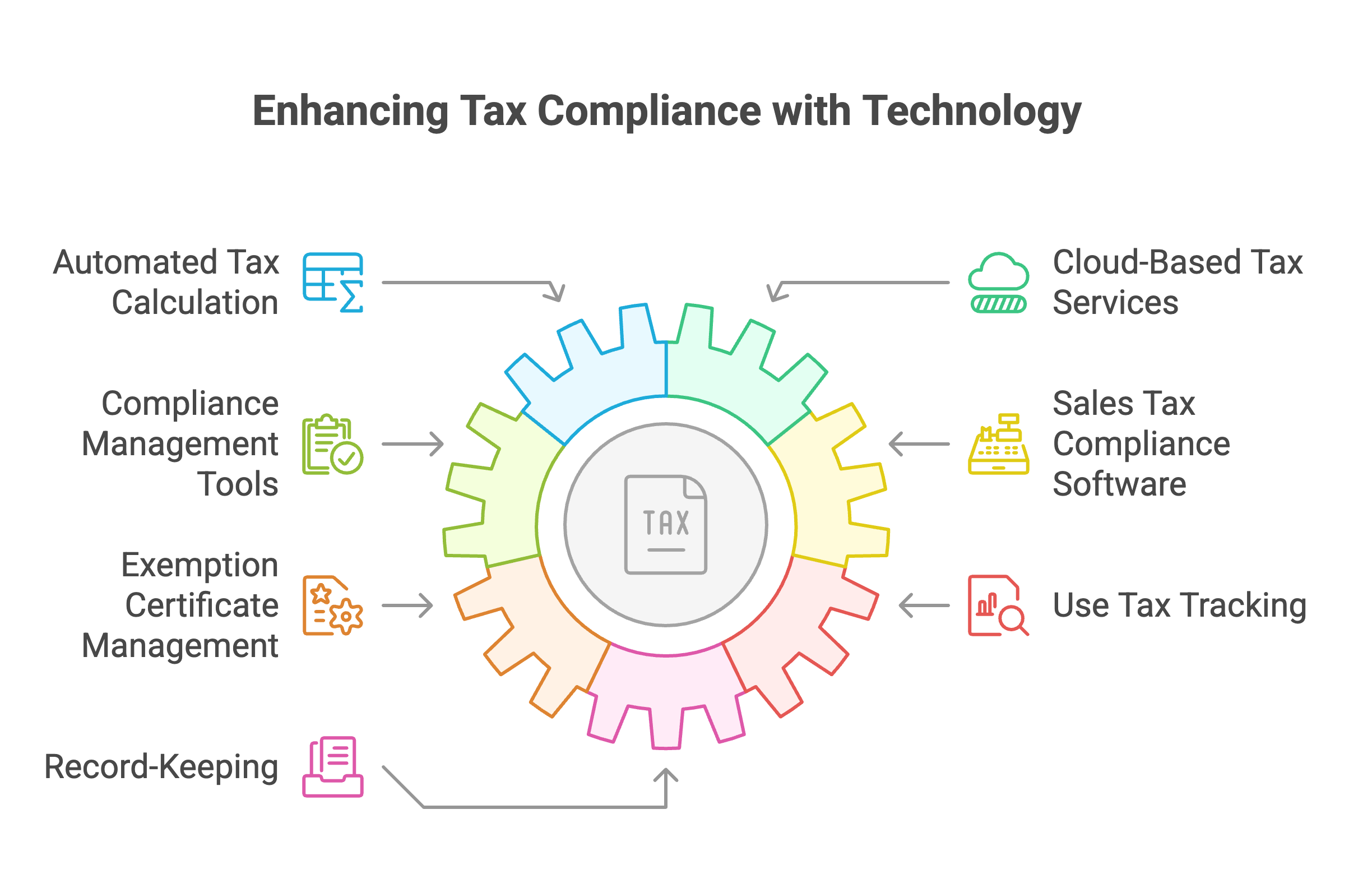Understanding Nevada's Sales Tax System
Nevada operates one of the more straightforward sales tax systems in the United States, but don't let that fool you into thinking compliance is simple. The state uses a combination of state and local rates that vary by county and city, creating different total rates across the state's diverse communities.
The Nevada Department of Taxation oversees the collection and administration of both state sales tax and local taxes throughout the state. This centralized approach simplifies filing for businesses but requires understanding how rates differ across Nevada's 17 counties.
What makes Nevada particularly interesting for businesses is that there's no state income tax, making sales tax a more significant revenue source for both state and local governments. This means the rates and compliance requirements receive careful attention from tax authorities.
Nevada's sales tax applies to most retail sales of tangible personal property, with specific rules for services, digital goods, and other transaction types that can affect how much tax you collect and remit.

Nevada's state sales tax rate is 6.85%, which forms the foundation for all sales tax calculations throughout the state. This state rate applies uniformly across all counties and cities, with local jurisdictions adding their own rates on top of this base.
The state rate funds essential government services including education, public safety, and infrastructure maintenance. Unlike some states that have different rates for different types of goods, Nevada applies the same state rate to most taxable transactions.
This consistent state rate simplifies compliance for businesses operating in multiple locations within Nevada, as only the local portion of the tax rate varies by location.
The Nevada Tax Commission can adjust the state rate, though changes are relatively rare and typically require legislative action for significant modifications.
Clark County, home to Las Vegas and the state's largest population center, has a combined sales tax rate of 8.375%. This includes the state base rate of 6.85% plus local county and city taxes totaling 1.525%.
Las Vegas itself maintains the 8.375% rate, while some smaller cities within Clark County may have slightly different rates depending on their local tax ordinances. North Las Vegas and Henderson follow similar rate structures.
The Las Vegas Strip, despite being a major tourist destination, generally follows the standard Clark County rate structure. However, specific properties or districts might have additional special assessments that don't affect standard retail sales tax.
Tourist-focused businesses in Clark County should note that the high volume of out-of-state customers doesn't change their obligation to collect Nevada sales tax on all qualifying transactions.
Washoe County, which includes Reno and Sparks, typically has combined rates around 7.725%, reflecting different local tax priorities compared to the Las Vegas area. This rate includes the state base plus local county and city additions.
Reno's rate structure supports both county and city services, with the local portion funding everything from public safety to infrastructure improvements. The slightly lower rate compared to Clark County reflects different local fiscal needs and policies.
Carson City, as an independent city-county, has its own rate structure that typically aligns closely with other northern Nevada jurisdictions but may have unique local tax components.
Smaller communities throughout northern Nevada generally have rates ranging from the state minimum of 6.85% up to around 7.5%, depending on local tax decisions.
Most rural Nevada counties have total sales tax rates ranging from 6.85% (state only) to 7.25%, depending on county and municipal tax additions. These lower rates reflect the different service needs and fiscal structures of rural communities.
Counties like Elko, Ely, and Winnemucca typically have modest local tax additions to the state base rate. These local taxes often fund specific services like fire protection, road maintenance, or other rural infrastructure needs.
Some rural areas may have special districts for services like hospital districts or fire protection that add small amounts to the base rate. These additions are typically less than 0.5% and apply only to specific geographic areas.
Businesses operating in multiple rural counties should verify rates for each location, as local tax policies can create variations even between neighboring communities.
Nevada use tax complements sales tax by ensuring that purchases made outside the state but used within Nevada are subject to tax. The use tax rate matches the sales tax rate for the location where the property is used.
Businesses that purchase goods from out-of-state suppliers without paying sales tax must self-assess and pay use tax on those purchases. This includes everything from office supplies bought online to equipment purchased from out-of-state vendors.
The use tax requirement helps level the playing field between in-state and out-of-state suppliers while ensuring that Nevada receives tax revenue on goods used within the state regardless of where they were purchased.
Consumer use tax applies to individuals who make purchases outside Nevada and use those goods within the state. While harder to enforce for small purchases, significant acquisitions like vehicles or expensive equipment often trigger use tax obligations.
Nevada businesses must track purchases made without sales tax and report use tax on their sales tax returns. This requires maintaining records of all purchases and identifying which ones require use tax assessment.
Common use tax situations include purchases from online retailers that don't collect Nevada sales tax, acquisitions from out-of-state suppliers, and goods purchased in other states for use in Nevada.
The use tax calculation uses the tax rate applicable to the location where the business uses the property, which may be different from where the business is located if goods are used at multiple sites.
Businesses should establish procedures for identifying use tax obligations and include these amounts in their regular sales tax filings to maintain compliance with Nevada tax laws.

Every business making taxable sales in Nevada must register with the Nevada Department of Taxation and obtain a sales tax permit before beginning operations. This includes both in-state businesses and out-of-state businesses with Nevada sales tax nexus.
The registration process requires business information including ownership details, estimated sales volumes, and business activity descriptions. The department uses this information to determine filing frequency and any required deposits.
Nevada requires separate registrations for each business location, though businesses can often file consolidated returns covering multiple locations within the state.
The registration process can be completed online through the Nevada Department of Taxation website, and there's no fee for obtaining a basic sales tax permit.
Most Nevada businesses file sales tax returns monthly, though smaller businesses may qualify for quarterly filing based on their tax liability amounts. The department assigns filing frequency based on expected tax collections.
Monthly filers must submit returns by the last day of the month following the reporting period. For example, January sales tax returns are due by February 28th or 29th in leap years.
Quarterly filers report on a calendar quarter basis, with returns due by the last day of the month following each quarter end. This means quarterly returns are due April 30th, July 31st, October 31st, and January 31st.
Nevada requires electronic filing and payment for most businesses, with online systems available through the Department of Taxation website for return preparation and submission.
Nevada requires out-of-state businesses to collect and remit sales tax if they exceed certain economic thresholds, even without physical presence in the state. Current thresholds include $100,000 in gross revenue or 200 separate transactions in Nevada during the previous 12 months.
Remote sellers meeting these thresholds must register for Nevada sales tax permits and begin collecting tax on Nevada sales. The economic nexus rules apply to both traditional retailers and marketplace sellers.
Marketplace facilitators like Amazon and eBay may collect and remit taxes on behalf of their sellers, but individual sellers remain responsible for understanding their obligations and ensuring compliance.
Businesses should monitor their Nevada sales activity to determine when they cross economic nexus thresholds and need to begin collecting Nevada sales tax.
Nevada provides exemptions for various types of transactions including sales for resale, manufacturing equipment, and certain agricultural products. These exemptions require proper documentation to support exempt sales.
Resale exemptions are the most common, allowing businesses to purchase inventory without paying sales tax when they have valid resale certificates from customers. These certificates must be maintained on file to support exempt sales.
Certain services are exempt from Nevada sales tax, though the line between taxable and exempt services can be complex. Professional services like legal and accounting work are generally exempt, while repair services and some personal services may be taxable.
Food for home consumption is generally exempt from Nevada sales tax, though prepared foods and restaurant meals are typically taxable. The distinction can be important for businesses in the food industry.
Some Nevada jurisdictions have special taxes or districts that may affect total tax rates in specific areas. These might include tourism improvement districts, redevelopment areas, or other special assessment districts.
Tourism improvement districts in areas like Las Vegas may have additional taxes that apply to specific types of businesses or transactions, though these don't typically affect standard retail sales tax rates.
Businesses should verify whether their location falls within any special districts that might affect their tax obligations beyond standard state and local sales tax.
The Nevada Department of Taxation website provides tools for determining exact tax rates for specific addresses, including any special district taxes that might apply.

Modern point-of-sale systems can automatically calculate Nevada sales tax based on business location and transaction details. This automation helps ensure accurate tax collection and reduces compliance burdens.
Cloud-based tax calculation services provide real-time rate updates and can integrate with e-commerce platforms, accounting systems, and point-of-sale hardware to ensure accurate tax calculations.
For businesses with multiple Nevada locations, automated systems can apply the correct rate for each location without requiring staff to memorize different rates for different areas.
Integration with accounting systems ensures that collected taxes are properly recorded and available for return preparation and filing with the Nevada Department of Taxation.
Sales tax compliance software can automate much of the return preparation and filing process by pulling transaction data from business systems and formatting it for Nevada tax returns.
These systems often include features for managing exemption certificates, tracking use tax obligations, and maintaining the detailed records required for tax compliance.
Cloud-based solutions offer advantages for businesses with remote management needs or multiple locations, providing access to tax information and compliance tools from anywhere with internet access.
The investment in compliance technology often pays for itself through reduced preparation time, fewer errors, and improved record-keeping that helps during potential audits.
Q: What is Nevada's current state sales tax rate for 2025?
A: Nevada's state sales tax rate is 6.85%. However, total rates vary by location due to local county and city taxes, with combined rates typically ranging from 6.85% to 8.375% depending on where the sale occurs.
Q: Do I need to collect Nevada sales tax on online sales?
A: Yes, if you have nexus in Nevada through physical presence or economic activity (currently $100,000 in sales or 200 transactions), you must collect Nevada sales tax on sales to Nevada customers regardless of how the sale is made.
Q: How often do I need to file Nevada sales tax returns?
A: Filing frequency depends on your tax liability amount. Most businesses file monthly, while smaller businesses may qualify for quarterly filing. The Nevada Department of Taxation assigns your filing frequency when you register.
Q: What is Nevada use tax and when does it apply?
A: Nevada use tax applies when you purchase taxable goods from out-of-state suppliers who don't collect Nevada sales tax. You must self-assess and pay use tax at the same rate as sales tax for your location.
Q: Are there any sales tax holidays in Nevada?
A: Nevada has had limited sales tax holiday periods in the past for items like emergency preparedness supplies, but these are not regular annual events. Check with the Nevada Department of Taxation for current information on any tax holidays.
Q: What records do I need to keep for Nevada sales tax compliance?
A: Maintain detailed records of all sales transactions, including invoices, receipts, cash register tapes, and exemption certificates. Nevada requires keeping these records for at least four years from the due date of the return.
Q: Can I get in trouble for collecting too much sales tax in Nevada?
A: If you accidentally collect more tax than required, you should either refund the excess to customers or remit it to the state. Consistently overcharging customers could create legal issues, so it's important to use correct rates.
Q: How do I find the exact sales tax rate for a specific Nevada location?
A: Use the Nevada Department of Taxation's online rate lookup tool on their website. Enter the complete address to get the current combined rate including state, county, city, and any special district taxes that apply to that location.

A practical comparison of hiring a freelancer vs using a dedicated offshore accounting team, focusing on continuity, quality control, security, and scaling.

How CPA firms outsource payroll and 1099 work to reduce penalties and admin load, with a clean workflow for approvals, filings, and year-end reporting.

Practical do's and don'ts for CPA firms outsourcing accounting work, based on common failure points and what successful rollouts do differently.